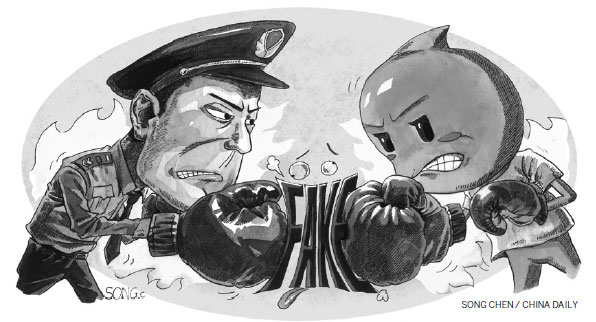Taobao and regulator must refine e-business
Updated: 2015-01-31 08:02
By Wu Yixue(China Daily)
|
||||||||
Despite the doubts, the report still sent shockwaves through consumers, especially online shoppers, across the country. Given that online shopping has become increasingly common among Chinese consumers, the report may dampen many people's enthusiasm in online retail, dealing a heavy blow to the country's prospering yet fledging e-commerce sector.
China's e-business has seen explosive growth in recent years, with its market volume rising from 4.5 trillion yuan ($720 billion) in 2010 to 8.2 trillion yuan in 2013, an annual growth of more than 25 percent. In the first half of 2014 alone, online transactions topped 5.66 trillion yuan.
E-commerce is attracting an increasing number of consumers, especially youths, because online shopping saves time and valuable costs. But apart from the benefits, the overgrowth of e-commerce has also come with excessive advertising and flow of counterfeit and substandard products, prompting the authorities to take measures to ensure quality.
The new law on the protection of consumers' rights and interests, which took effect on March 15 last year, gives consumers the right to unconditionally cancel a deal within seven days of receiving goods bought online. But quite a few online shoppers still complain that they face trouble returning goods or getting their dues in case of online disputes. This, along with other problems associated with e-commerce, calls for SAIC to make greater efforts to strengthen monitoring and improve the online shopping process.

Although e-commerce platforms in other parts of the world are also struggling to prevent substandard and counterfeit goods from entering the online chain, it cannot be used by SAIC and online shopping platforms as an excuse for inaction or lax monitoring.
The booming sector should be encouraged to expand business provided the ever-increasing number of online shoppers are guaranteed delivery of authentic goods.
And it is time Alibaba and SAIC sat down to work out more feasible ways to prevent fake and substandard goods from entering the online selling-and-buying chain instead of engaging in legal battles.
The author is a senior writer with China Daily. wuyixue@chinadaily.com.cn
- Global health entering new era: WHO chief
- Brazil's planning minister steps aside after recordings revelation
- Vietnam, US adopt joint statement on advancing comprehensive partnership
- European border closures 'inhumane': UN refugee agency
- Japan's foreign minister calls A-bombings extremely regrettable
- Fukushima impact unprecedented for oceans: US expert

 Stars of Lijiang River: Elderly brothers with white beards
Stars of Lijiang River: Elderly brothers with white beards
 Wealthy Chinese children paying money to learn British manners
Wealthy Chinese children paying money to learn British manners
 Military-style wedding: Fighter jets, grooms in dashing uniforms
Military-style wedding: Fighter jets, grooms in dashing uniforms
 Striking photos around the world: May 16 - May 22
Striking photos around the world: May 16 - May 22
 Robots help elderly in nursing home in east China
Robots help elderly in nursing home in east China
 Hanging in the air: Chongqing holds rescue drill
Hanging in the air: Chongqing holds rescue drill
 2.1-ton tofu finishes in two hours in central China
2.1-ton tofu finishes in two hours in central China
 Six things you may not know about Grain Buds
Six things you may not know about Grain Buds
Most Viewed
Editor's Picks

|

|

|

|

|

|
Today's Top News
Liang avoids jail in shooting death
China's finance minister addresses ratings downgrade
Duke alumni visit Chinese Embassy
Marriott unlikely to top Anbang offer for Starwood: Observers
Chinese biopharma debuts on Nasdaq
What ends Jeb Bush's White House hopes
Investigation for Nicolas's campaign
Will US-ASEAN meeting be good for region?
US Weekly

|

|








